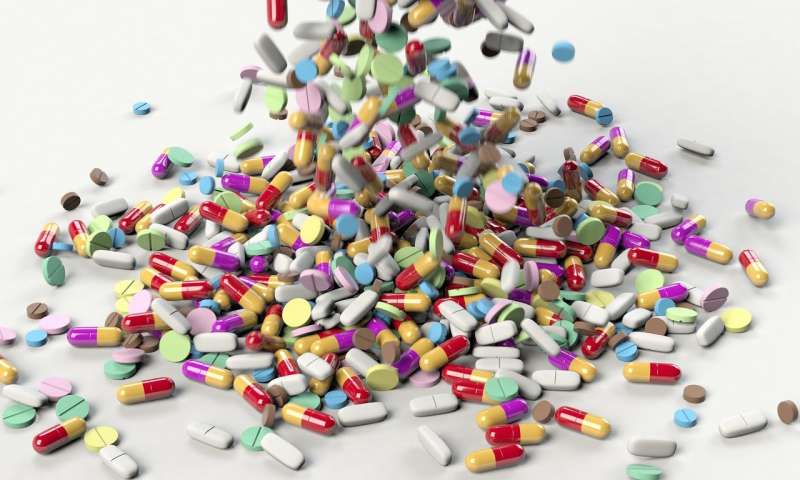This article has been reviewed according to Science X's editorial process and policies. Editors have highlighted the following attributes while ensuring the content's credibility:
fact-checked
trusted source
proofread
Social media and medications: Physicians discuss the risks and benefits of advertising

As social media platforms like TikTok and Instagram have risen in popularity, so have direct-to-consumer advertisements for drugs like Ozempic, whether it be pop-up advertisements or social media influencers promoting products to their followers. Now, more and more people are asking their doctors to prescribe them drugs they have seen in advertisements, prompting three chief medical residents—Lynne Rosenberg, MD, Samantha Thielen, MD, and Evan Zehr, MD—in the University of Colorado Internal Medicine Residency Program to deliberate: Is this a beneficial or harmful occurrence?
The answer, they discovered, is complex and evolving. For some patients, research has found they feel more empowered to have conversations with the medical providers and advocate for what they want. On the other hand, some physicians have reported negative effects, such as increased pressure to prescribe medication they may not think their patient needs.
"Direct-to-consumer advertising differentially impacts all facets of health care—the provider experience, the patient experience, population health, and cost," Thielen said during a recent Medical Grand Rounds presentation. "Despite government efforts to protect consumers, regulations have not yet addressed the expansion of direct-to-consumer advertising beyond classic avenues in the digital age."
Although the rise of social media brings unprecedented challenges, the chief medical residents emphasized that the digital landscape also serves as a platform that health care providers can—and should—use to their advantage.
How advertising impacts patients, physicians
Research has found that direct-to-consumer advertising impacts the health care system in a multitude of ways, including some opposing effects on patients versus health care providers.
For many patients, they will seek additional health-related information in response to advertisements, whether it be about a new symptom or condition. Studies show that 7–33% of patients have asked their provider for a prescription in response to an advertisement. Research also suggests the more patients are exposed to advertisements, the more likely they are to request the medication from their provider.
"Not only does advertising impact patient behavior—it also impacts patient perception of their health care delivery. Patients feel empowered in response to advertisements," Thielen said. "They like coming to their doctor armed with knowledge and thoughtful questions."
For physicians, however, many have reported more negative effects of direct-to-consumer advertising. Physicians consistently indicate that they feel an increased pressure to prescribe and respond to requests from patients.
Advertisements also affect physicians' perceptions of their patients, as surveys of physicians have consistently shown that they believe their patients have an incomplete understanding of the medications that they see in advertisements, as well as lack knowledge about the side effects, limitations, or cost of the drugs. Many physicians also reported they feel their patients overestimate the benefit of the drug.
Additionally, physicians perceive a negative impact on their patient relationships because of advertising for a variety of other reasons. Physicians report that it can be challenging when patients gain a false sense of autonomy based on misinterpreting advertisements. They also say that conflict can arise when they don't prescribe a requested medication. Others say that advertisements result in medical encounters being more transactional rather than based on trust.
The rise of direct-to-consumer advertising
In the current digital age, many people encounter drug advertisements every day, whether it be a TV commercial, a pop-up advertisement on a website, or sponsored content on social media platforms. This was not always the case. In fact, prior to 1980, most drug advertisements in the U.S. were targeted toward physicians—not consumers. That changed in 1983 when the first commercial for a drug aired on TV.
With the rise of social media platforms like Facebook, Instagram, and TikTok, the marketing of drugs to consumers has only expanded, prompting the need for federal regulations around direct-to-consumer advertising on social media.
In 2014, the FDA released its first draft guidance for drug advertising on social media platforms, stating that if a company makes a benefit claim, then it must also include the risks and direct access to more information. This draft was made final in 2023, requiring advertisements to be presented in a clear, conspicuous, and neutral manner.
"But it's not always the company making the claims. Some folks making claims about drugs online are people who have used the medicine, had a family member use it, or just read about it. They are by no means experts in the risks and benefits of these medications, and they have no regulations on their statements," Rosenberg said.
Although the FDA has drafted guidance on correcting third-party misinformation, it cannot require companies to correct misinformation.
"Today, we're living in a country in which direct-to-consumer advertising is legal, online platforms are growing rapidly, and the FDA is trying to keep up with the ever-growing world of social media," Rosenberg said.
Unprecedented challenges—and opportunities
Social media allows patients to have unprecedented access to medication and information about it, leaving many physicians to wonder how they can best advocate for their patients. For Thielen, Rosenberg, and Zehr, the answer is not to push against social media, but rather to embrace it.
For example, physicians can create their own content on social media as a way to discuss medical topics and dispel misinformation. For those who are not comfortable creating their own content, they can still use social media platforms to re-share the work of their colleagues and other credible sources.
Physicians can also recommend to their patients that they follow the social media accounts of official institutions like the FDA or Centers for Disease Control and Prevention. By connecting patients to these accounts, it helps increase the likelihood that patients will see more credible content on their social media feeds.
"Rather than shying away from an expansion of direct-to-consumer advertising in the digital age, we urge providers to embrace this as an opportunity to advance patient education," Thielen said.

















